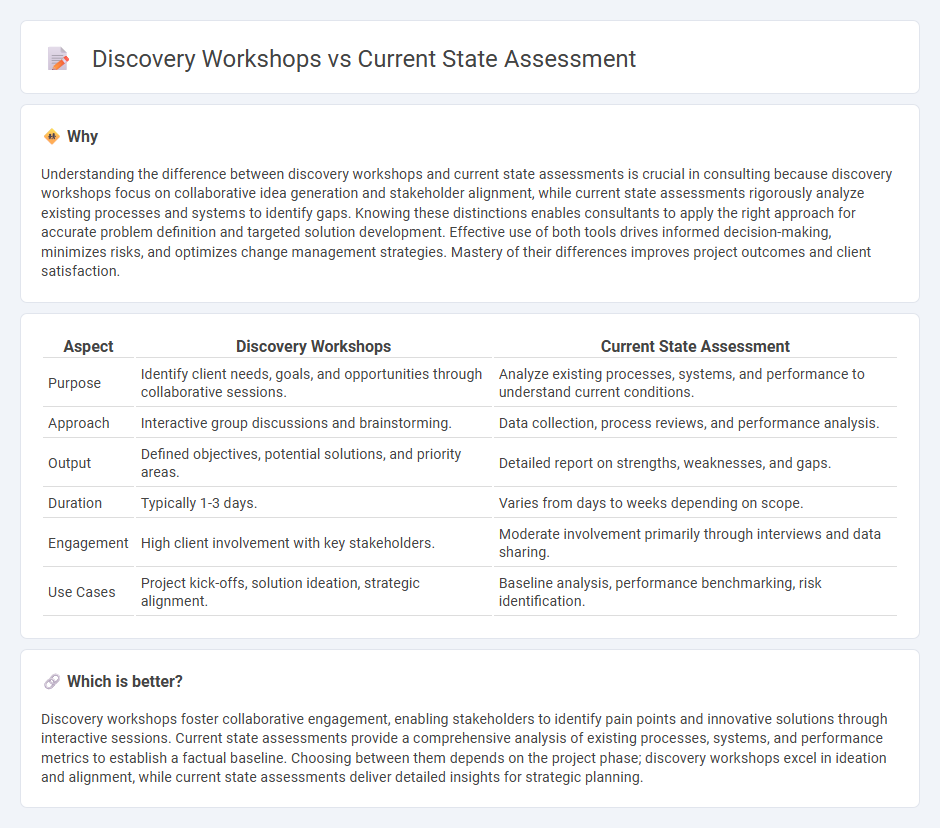
Discovery workshops facilitate collaborative sessions to uncover client needs, goals, and pain points through stakeholder engagement and interactive exercises. Current state assessments analyze existing processes, systems, and performance metrics to identify gaps and opportunities for improvement. Explore how these consulting approaches drive informed decision-making and tailored strategies for organizational success.
Why it is important
Understanding the difference between discovery workshops and current state assessments is crucial in consulting because discovery workshops focus on collaborative idea generation and stakeholder alignment, while current state assessments rigorously analyze existing processes and systems to identify gaps. Knowing these distinctions enables consultants to apply the right approach for accurate problem definition and targeted solution development. Effective use of both tools drives informed decision-making, minimizes risks, and optimizes change management strategies. Mastery of their differences improves project outcomes and client satisfaction.
Comparison Table
| Aspect | Discovery Workshops | Current State Assessment |
|---|---|---|
| Purpose | Identify client needs, goals, and opportunities through collaborative sessions. | Analyze existing processes, systems, and performance to understand current conditions. |
| Approach | Interactive group discussions and brainstorming. | Data collection, process reviews, and performance analysis. |
| Output | Defined objectives, potential solutions, and priority areas. | Detailed report on strengths, weaknesses, and gaps. |
| Duration | Typically 1-3 days. | Varies from days to weeks depending on scope. |
| Engagement | High client involvement with key stakeholders. | Moderate involvement primarily through interviews and data sharing. |
| Use Cases | Project kick-offs, solution ideation, strategic alignment. | Baseline analysis, performance benchmarking, risk identification. |
Which is better?
Discovery workshops foster collaborative engagement, enabling stakeholders to identify pain points and innovative solutions through interactive sessions. Current state assessments provide a comprehensive analysis of existing processes, systems, and performance metrics to establish a factual baseline. Choosing between them depends on the project phase; discovery workshops excel in ideation and alignment, while current state assessments deliver detailed insights for strategic planning.
Connection
Discovery workshops facilitate in-depth collaboration with stakeholders to uncover business goals, challenges, and processes, which informs the current state assessment by providing detailed qualitative and quantitative insights. The current state assessment then analyzes these findings to map existing workflows, system capabilities, and organizational performance, establishing a baseline for strategic recommendations. This connection ensures that consulting solutions are tailored to accurately address identified gaps and optimize operational efficiency.
Key Terms
Gap Analysis
Current state assessments provide a comprehensive evaluation of an organization's existing processes and systems to identify inefficiencies and areas for improvement, while discovery workshops engage stakeholders interactively to gather detailed insights and foster collaborative problem-solving. Gap analysis leverages findings from both approaches to highlight discrepancies between current capabilities and desired future states, guiding strategic decision-making and prioritization of initiatives. Explore deeper into how combining these methods enhances organizational transformation outcomes.
Stakeholder Alignment
Current state assessments provide a comprehensive analysis of existing processes and systems, enabling clear identification of stakeholder viewpoints and potential misalignments. Discovery workshops foster active engagement among stakeholders, encouraging collaboration and consensus-building to align goals and expectations effectively. Explore techniques to enhance stakeholder alignment through targeted assessments and interactive workshops.
Data Collection
Current state assessment emphasizes a detailed analysis of existing systems, processes, and data flows to identify gaps and inefficiencies, relying heavily on quantitative data collection methods such as audits and metrics evaluation. Discovery workshops prioritize interactive sessions with stakeholders to gather qualitative insights, uncover hidden requirements, and align on future goals through collaborative discussions and brainstorming. Explore the nuances and best practices of both approaches to enhance your data collection strategy.
Source and External Links
Current-State Assessment simply explained - A Current State Assessment involves collecting and analyzing the existing state of a process, system, or project to understand its current performance, identify inefficiencies, and provide a basis for planning improvements, often conducted through data collection, observations, and SWOT analysis in a neutral, objective manner.
What Is Current State Analysis? Benefits and Steps - The process includes focusing on a single product or service, identifying all related processes, and using research methods like interviews and observations to comprehensively understand the present workflow and areas for improvement.
The beginner's guide to current state assessments - This assessment is a business process used to evaluate an organizational issue by identifying the problem's components, comparing the current state to an ideal future state, and typically follows a phased framework including building the process, data collection, assessment, and problem solving.
 dowidth.com
dowidth.com